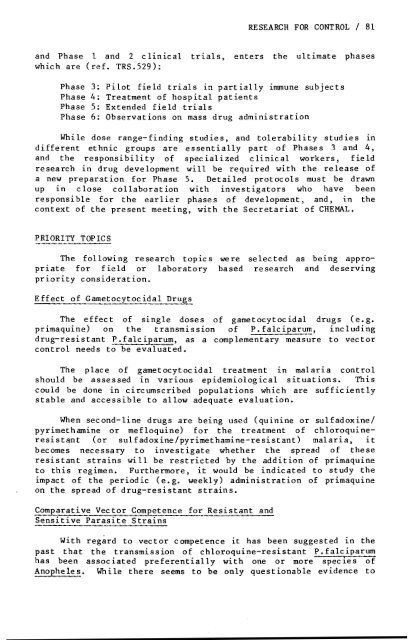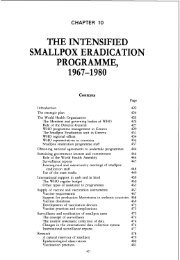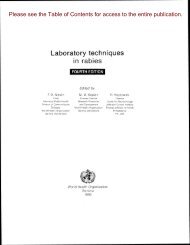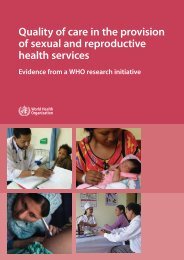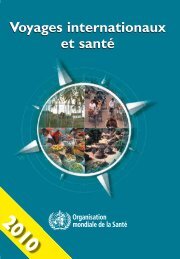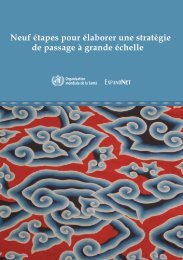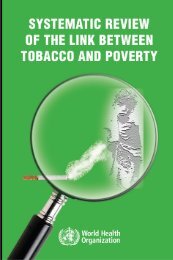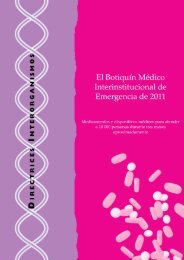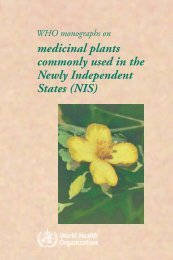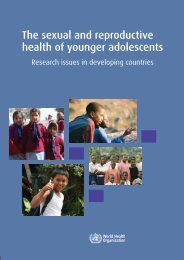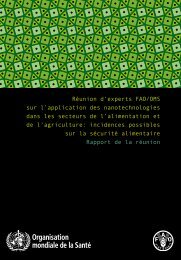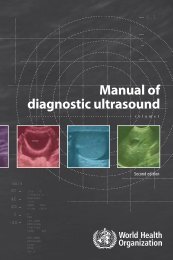Drug-Resistant Malaria - libdoc.who.int - World Health Organization
Drug-Resistant Malaria - libdoc.who.int - World Health Organization
Drug-Resistant Malaria - libdoc.who.int - World Health Organization
Create successful ePaper yourself
Turn your PDF publications into a flip-book with our unique Google optimized e-Paper software.
RESEARCH FOR CONTROL / 81<br />
and Phase 1 and 2 clinical trials, enters the ultimate phases<br />
which are (ref. TRS.529):<br />
Phase 3: Pilot field trials in partially immune subjects<br />
Phase 4: Treatment of hospital patients<br />
Phase 5: Extended field trials<br />
Phase 6: Observations on mass drug administration<br />
While dose range-finding studies, and tolerability studies m<br />
different ethnic groups are essentially part of Phases 3 and 4,<br />
and the responsibility of specialized clinical workers, field<br />
research in drug development will be required with the release of<br />
a new preparation for Phase 5. Detai led protocols must be drawn<br />
up in close collaboration with investigators <strong>who</strong> have been<br />
responsible for the earlier phases of development, and, in the<br />
context of the present meeting, with the Secretariat of CHEMAL.<br />
PRIORITY TOPICS<br />
The following research topics<br />
priate for field or laboratory<br />
priority consideration.<br />
were<br />
based<br />
selected as being approresearch<br />
and deserving<br />
Effect of Gametocyt3cidal <strong>Drug</strong>s<br />
The effect of single doses of gametocytocidal drugs (e.g.<br />
primaquine) on the transmission of P. falciparum, including<br />
drug-resistant P.falciparum, as a complementary measure to vector<br />
control needs to~evaiuated.<br />
The place of gametocytocidal treatment in malaria control<br />
should be assessed 1n various epidemiological situations. This<br />
could be done in circumscribed populations which are sufficiently<br />
stable and accessible to allow adequate evaluation.<br />
When second-line drugs are being used (quinine or sulfadoxine/<br />
pyrimethamine or mefloquine) for the treatment of chloroquineresistant<br />
(or sulfadoxine/pyrimethamine-resistant) malaria, it<br />
becomes necessary to investigate whether the spread of these<br />
resistant strains will be restricted by the addition of primaquine<br />
to this regimen. Furthermore, it would be indicated to study the<br />
impact of the periodic (e.g. weekly) administration of primaquine<br />
on the spread of drug-resistant strains.<br />
Comparative Vector Competence for <strong>Resistant</strong> and<br />
Sensitive Parasite Strain~-----<br />
With regard to vector competence it has been suggested in the<br />
past that the transmission of chloroquine-resistant P.falciparum<br />
has been associated preferentially with one or more species of<br />
Anopheles. While there seems to be only questionable evidence to


